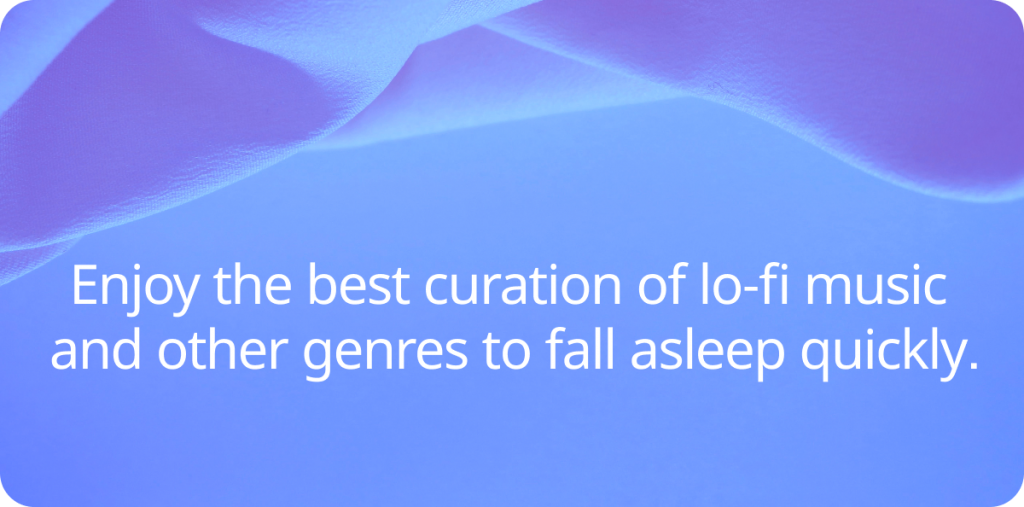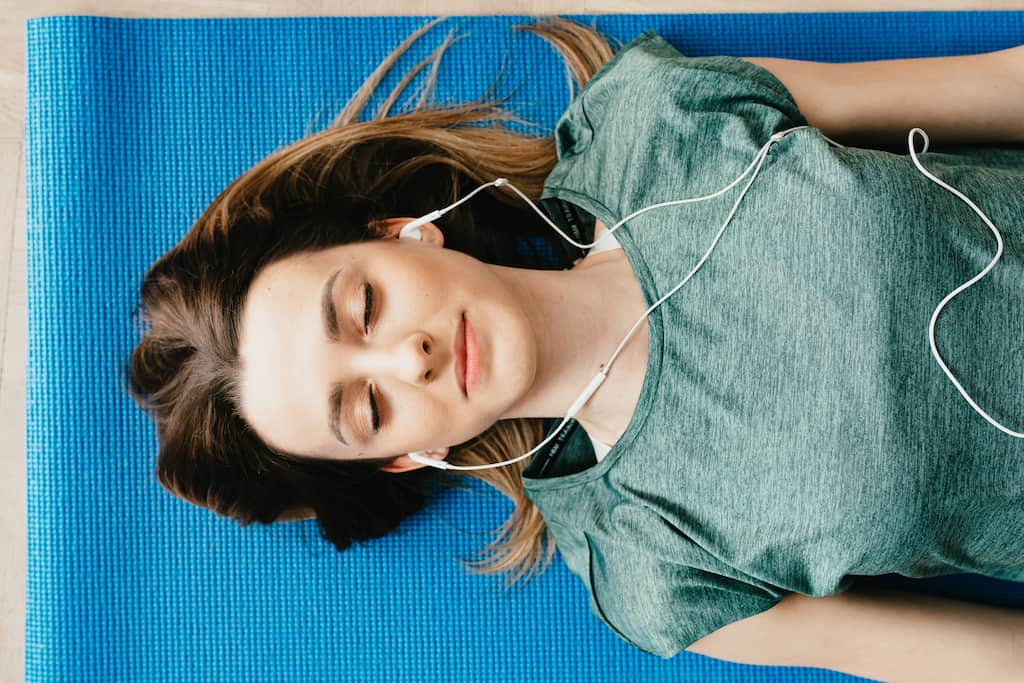Music to Fall Asleep To: Rediscovering Its Healing Power

Is there anything worse than having to wake up early and spend hours tossing and turning? Well, probably yes. But those next 24 hours feel like climbing a mountain, don’t they? The modern world’s constant chaos can make it challenging to unwind and relax, but there’s a solution at hand – music to fall asleep to.
In this article, we’ll dive into how music, specifically crafted for bedtime, solves the age-old problem of sleeplessness and restlessness. Discover the profound ways in which these melodies can transform your nights, soothe your soul, and help you rediscover the healing power of a truly restful slumber.

Fall Asleep Music: Where Does It Come From?
Throughout the annals of history, the soothing power of music has been harnessed to lull individuals into a restful slumber. The origins of using music as a sleep aid can be traced back centuries, with evidence from ancient civilizations such as the Egyptians, Greeks, and Romans. These early cultures recognized the potential of melodies to calm the mind and usher in tranquility at the end of a long day.
In medieval Europe, minstrels and troubadours serenaded nobility with gentle tunes, providing a sense of relaxation and respite from the demands of courtly life. Even in more recent times, composers like Johannes Brahms and Wolfgang Amadeus Mozart composed music designed to induce sleep often referred to as “berceuse” or “lullabies.”
Beyond Europe, various cultures worldwide have embraced music as a means to facilitate relaxation and sleep. The soothing sounds of traditional Chinese, Japanese, and Indian instruments have been used for centuries to create an atmosphere of tranquility. Native American tribes utilized chanting and drumming to connect with the spiritual world and find inner peace during their rest.
These diverse cultural traditions all attest to the universal appeal of music as a tool for promoting relaxation and restful sleep.
The physiological and psychological effects of music on sleep
To truly appreciate the power of fall asleep music, it’s essential to understand the science behind its effectiveness. Music has a profound impact on both our physiology and psychology, making it a potent tool for enhancing the quality of our sleep.
- Physiologically, when we listen to calming and slow-tempo music, our bodies respond by lowering heart rate, reducing blood pressure, and decreasing the levels of stress hormones such as cortisol. This physical relaxation helps prepare the body for sleep by signaling to the nervous system that it’s time to unwind.
- Psychologically, music can have a soothing effect on the mind. It can divert our attention away from intrusive thoughts, worries, and daily stresses, promoting a state of mental calmness. This shift in focus creates an ideal mental environment for drifting into slumber.
Here you have 2 hours of free music to fall asleep to:
The role of brainwaves and relaxation in relation to music
The interplay between music and brainwaves is a fascinating aspect of the sleep-inducing power of music. Different types of music can influence our brainwave patterns, which play a crucial role in our ability to relax and fall asleep.
When we are awake and alert, our brains produce beta brainwaves. As we transition into relaxation and the early stages of sleep, alpha brain waves become more prominent. Music with a slow tempo and soothing melodies encourages the brain to shift from beta to alpha brain waves, signaling the brain that it’s time to wind down.
In deeper stages of sleep, such as delta and theta brainwaves, music can continue to provide a calming influence, helping to maintain a peaceful slumber throughout the night.
Types of Music to Fall Asleep to
The world of fall-asleep music is as diverse as the musical spectrum itself. Different genres and styles cater to various tastes and preferences, ensuring there’s a perfect lullaby for everyone seeking a peaceful night’s rest.
- Classical Music: Classical compositions, especially those with slow tempos and minimalistic arrangements, have long been favored for their ability to induce relaxation and sleep. Works by composers like Johann Pachelbel, Erik Satie, and Claude Debussy often feature prominently in sleep playlists.
- Ambient and Electronic: Ambient and electronic music create immersive soundscapes that gently transport the listener into a state of tranquility.
- Nature Sounds: The soothing sounds of nature, such as ocean waves, rain, or birdsong, can have a calming effect on the mind. Nature-inspired compositions or recordings bring the outdoors indoors, offering a serene backdrop for sleep.
- Chillout and Downtempo: Contemporary genres like chillout and downtempo incorporate elements of electronic and acoustic music to create mellow, dreamy soundscapes.

What Is Lo-Fi Music And Why Does It Promote Sleep
“Lo-fi” is a term derived from “low fidelity,” and it refers to a genre of music characterized by its intentionally low-quality production. Lo-fi music is often associated with a vintage or retro aesthetic and is created using simple recording techniques, which may include background noise, vinyl crackles, and imperfections in the audio quality.
This genre is known for its calming and soothing qualities, making it a popular choice for promoting sleep and relaxation. Here’s why lo-fi music is effective in this regard:
- Simplicity
- Repetition
- Background Noise
- Lack of Distractions
- Emotional Resonance
If you’re interested in this genre or any other we have mentioned in this blog, download Meditopia and take a look at our music library, many melodies get you to fall asleep quickly.
Practical Tips for Using Fall Asleep Music
The right timing and approach to incorporating the best sleeping music into your bedtime routine can significantly impact its effectiveness. Here are some practical tips to help you make the most of this soothing practice:
1. Establish a consistent routine by playing your chosen fall-asleep music at the same time each night. This helps signal to your body that it’s time to wind down and prepare for sleep.
2. Begin playing your chosen music at least 30 minutes before you intend to sleep. This allows you to gradually transition into a state of relaxation, reducing the chances of racing thoughts interfering with your ability to fall asleep.
Our app has a timer incorporated into the music and relaxing sounds section, so you can choose the best length according to your needs.
3. Dim the lights, lower the room temperature, and make sure your sleep environment is comfortable and conducive to relaxation.
Can You Meditate With Music?
If meditation is part of your routine to fall asleep, you may ask if you can use music for this practice. And the answer is: Absolutely!
While traditionally practiced in silence or with the focus solely on one’s breath, you can listen to a soft tune to accompany your practice.
Final Thoughts
Whether you choose the timeless simplicity of instrumental compositions or find comfort in lyrical sleep music, the key lies in the harmony it brings to your bedtime routine.
By adhering to practical tips, such as consistent timing and volume control, you can harness the healing power of music for a peaceful night’s sleep.
In the end, the ability to fall asleep to the soothing strains of music or to embark on a meditative journey with its ethereal melodies is a testament to the remarkable versatility of music.

